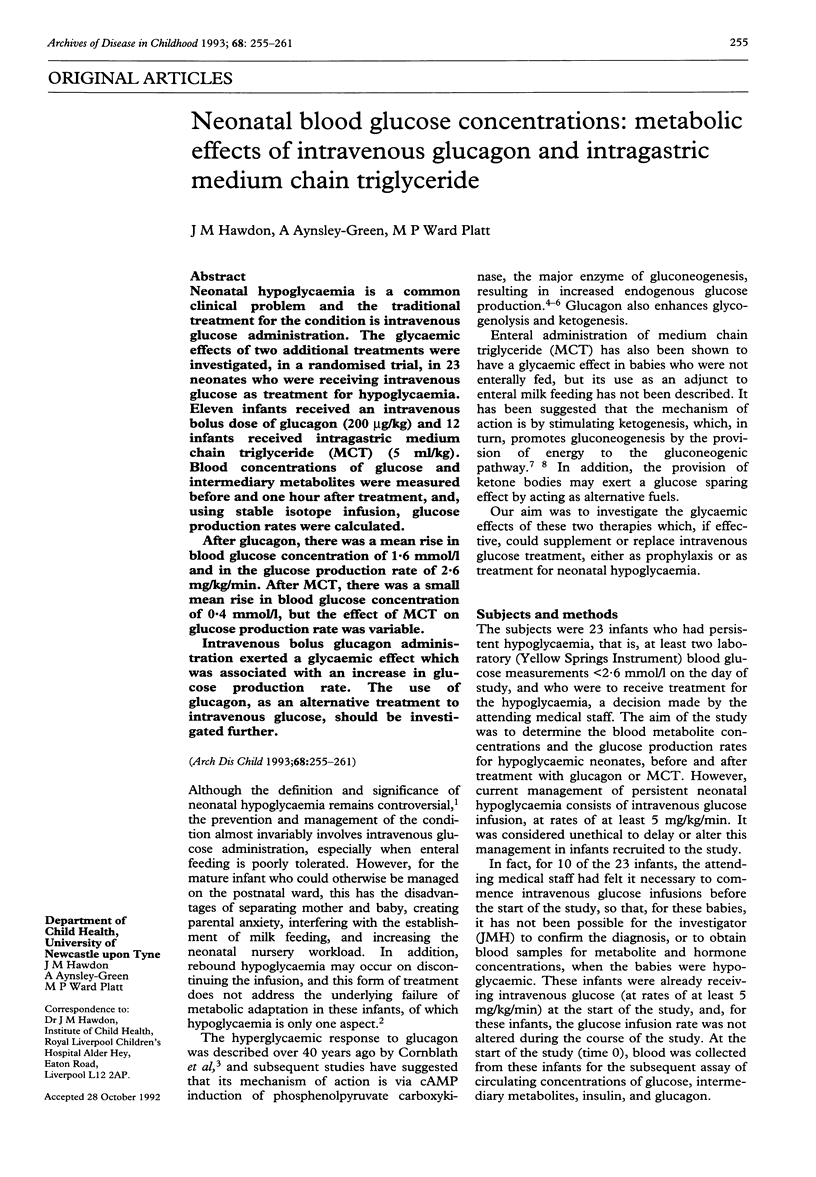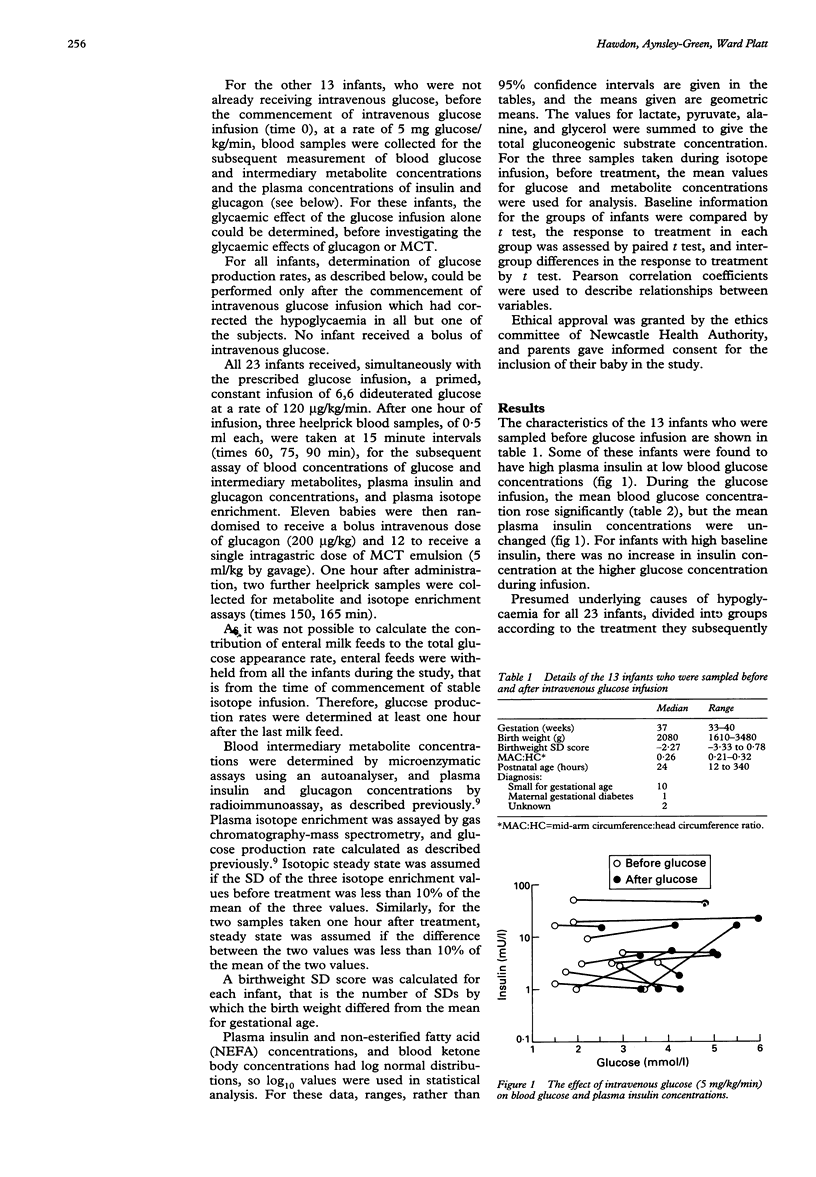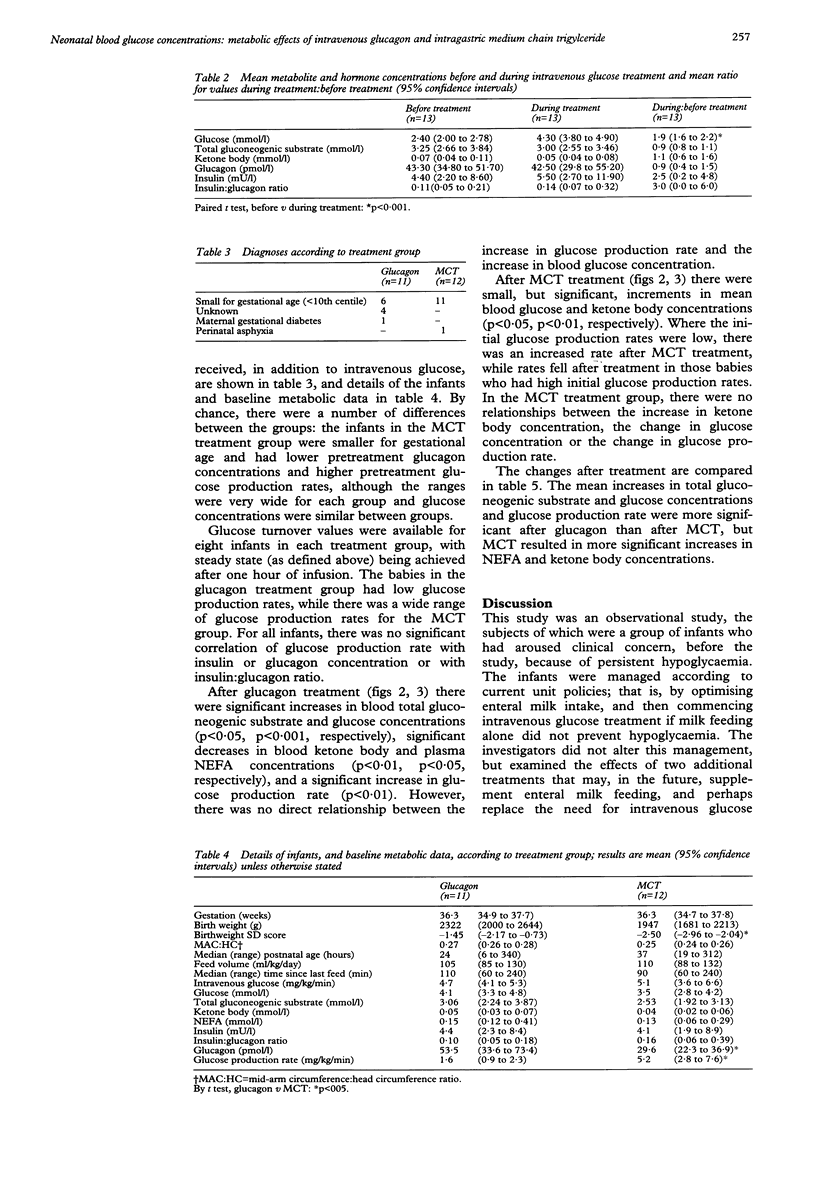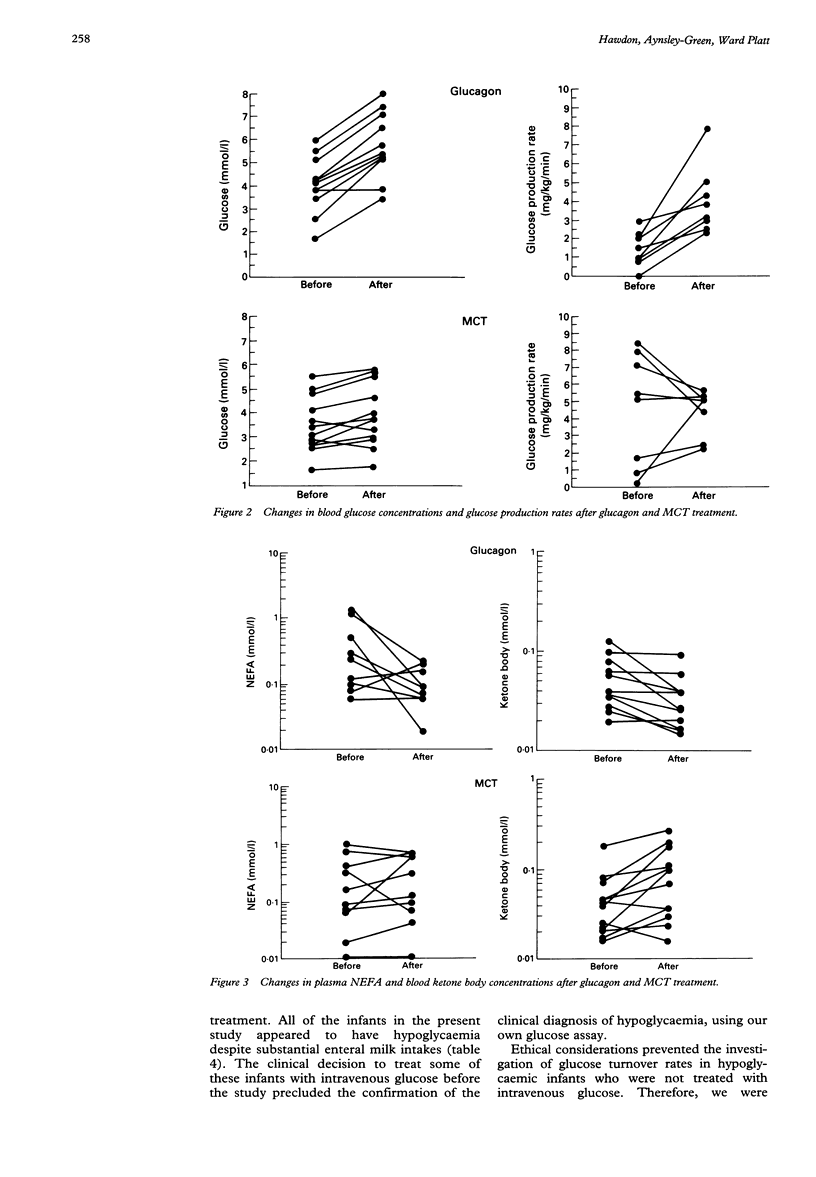Abstract
Neonatal hypoglycaemia is a common clinical problem and the traditional treatment for the condition is intravenous glucose administration. The glycaemic effects of two additional treatments were investigated, in a randomised trial, in 23 neonates who were receiving intravenous glucose as treatment for hypoglycaemia. Eleven infants received an intravenous bolus dose of glucagon (200 micrograms/kg) and 12 infants received intragastric medium chain triglyceride (MCT) (5 ml/kg). Blood concentrations of glucose and intermediary metabolites were measured before and one hour after treatment, and, using stable isotope infusion, glucose production rates were calculated. After glucagon, there was a mean rise in blood glucose concentration of 1.6 mmol/l and in the glucose production rate of 2.6 mg/kg/min. After MCT, there was a small mean rise in blood glucose concentration of 0.4 mmol/l, but the effect of MCT on glucose production rate was variable. Intravenous bolus glucagon administration exerted a glycaemic effect which was associated with an increase in glucose production rate. The use of glucagon, as an alternative treatment to intravenous glucose, should be investigated further.
Full text
PDF






Selected References
These references are in PubMed. This may not be the complete list of references from this article.
- Bougnères P. F. Stable isotope tracers and the determination of fuel fluxes in newborn infants. Biol Neonate. 1987;52 (Suppl 1):87–96. doi: 10.1159/000242742. [DOI] [PubMed] [Google Scholar]
- Bussey M. E., Finley S., LaBarbera A., Ogata E. S. Hypoglycemia in the newborn growth-retarded rat: delayed phosphoenolpyruvate carboxykinase induction despite increased glucagon availability. Pediatr Res. 1985 Apr;19(4):363–367. [PubMed] [Google Scholar]
- CORNBLATH M., LEVIN E. Y., MARQUETTI E. Studies of carbohydrate metabolism in the newborn. II. The effect of glucagon on the concentration of sugar in capillary blood of the newborn infant. Pediatrics. 1958 Jun;21(6):885–892. [PubMed] [Google Scholar]
- Carter P. E., Lloyd D. J., Duffty P. Glucagon for hypoglycaemia in infants small for gestational age. Arch Dis Child. 1988 Oct;63(10):1264–1266. doi: 10.1136/adc.63.10.1264. [DOI] [PMC free article] [PubMed] [Google Scholar]
- Cornblath M., Schwartz R., Aynsley-Green A., Lloyd J. K. Hypoglycemia in infancy: the need for a rational definition. A Ciba Foundation discussion meeting. Pediatrics. 1990 May;85(5):834–837. [PubMed] [Google Scholar]
- Cowett R. M., Susa J. B., Oh W., Schwartz R. Glucose kinetics in glucose-infused small for gestational age infants. Pediatr Res. 1984 Jan;18(1):74–79. [PubMed] [Google Scholar]
- Hawdon J. M., Aynsley-Green A., Bartlett K., Ward Platt M. P. The role of pancreatic insulin secretion in neonatal glucoregulation. II. Infants with disordered blood glucose homoeostasis. Arch Dis Child. 1993 Mar;68(3 Spec No):280–285. doi: 10.1136/adc.68.3_spec_no.280. [DOI] [PMC free article] [PubMed] [Google Scholar]
- Hawdon J. M., Ward Platt M. P. Metabolic adaptation in small for gestational age infants. Arch Dis Child. 1993 Mar;68(3 Spec No):262–268. doi: 10.1136/adc.68.3_spec_no.262. [DOI] [PMC free article] [PubMed] [Google Scholar]
- Le Dune M. A. Response to glucagon in small-for-dates hypoglycaemic and non-hypoglycaemic newborn infants. Arch Dis Child. 1972 Oct;47(255):754–759. doi: 10.1136/adc.47.255.754. [DOI] [PMC free article] [PubMed] [Google Scholar]
- Linarelli L. G., Bobik C., Bobik J., Drash A. L., Rubin H. M. The effect of glucagon on adenosine 3',5'-monophosphate (cyclic AMP), glucose, insulin and growth hormone in the full term newborn and children. J Clin Endocrinol Metab. 1974 Sep;39(3):411–417. doi: 10.1210/jcem-39-3-411. [DOI] [PubMed] [Google Scholar]
- Mehta A., Wootton R., Cheng K. N., Penfold P., Halliday D., Stacey T. E. Effect of diazoxide or glucagon on hepatic glucose production rate during extreme neonatal hypoglycaemia. Arch Dis Child. 1987 Sep;62(9):924–930. doi: 10.1136/adc.62.9.924. [DOI] [PMC free article] [PubMed] [Google Scholar]
- Milner R. D., Wright A. D. Plasma glucose, non-esterified fatty acid, insulin and growth hormone response to glucagon in the newborn. Clin Sci. 1967 Apr;32(2):249–255. [PubMed] [Google Scholar]
- Sann L., Divry P., Lasne Y., Ruitton A. Effect of oral lipid administration on glucose homeostasis in small-for-gestational-age infants. Acta Paediatr Scand. 1982 Nov;71(6):923–927. doi: 10.1111/j.1651-2227.1982.tb09550.x. [DOI] [PubMed] [Google Scholar]
- Sann L., Mathieu M., Lasne Y., Ruitton A. Effect of oral administration of lipids with 67% medium chain triglycerides on glucose homeostasis in preterm neonates. Metabolism. 1981 Jul;30(7):712–716. doi: 10.1016/0026-0495(81)90088-3. [DOI] [PubMed] [Google Scholar]
- Schultz K., Mestyán J., Soltész G., Horváth M. The metabolic effects of glucagon infusion in normoglycaemic and hypoglycaemic small-for-gestational-age infants. I. Changes in blood glucose, blood lactate and plasma free fatty acids. Acta Paediatr Acad Sci Hung. 1976;17(3):237–244. [PubMed] [Google Scholar]
- Shelley H. J., Neligan G. A. Neonatal hypoglycaemia. Br Med Bull. 1966 Jan;22(1):34–39. doi: 10.1093/oxfordjournals.bmb.a070433. [DOI] [PubMed] [Google Scholar]


